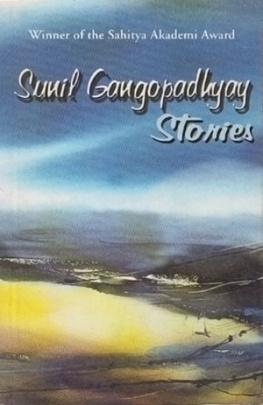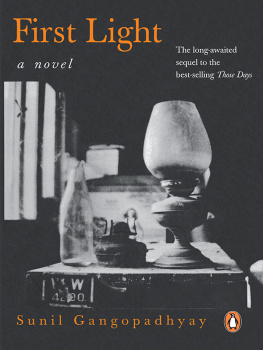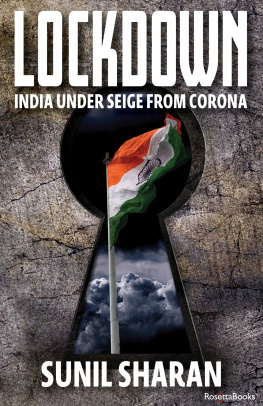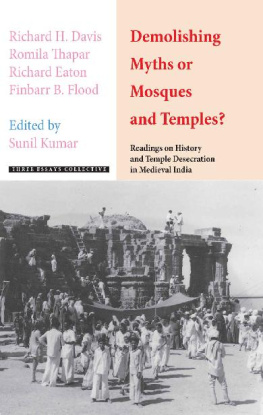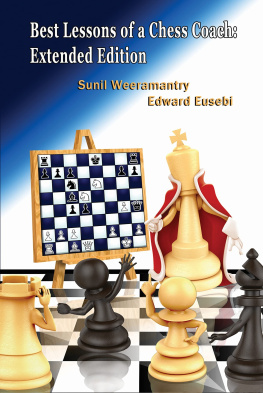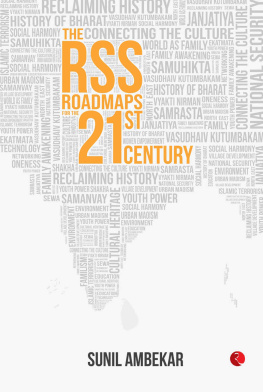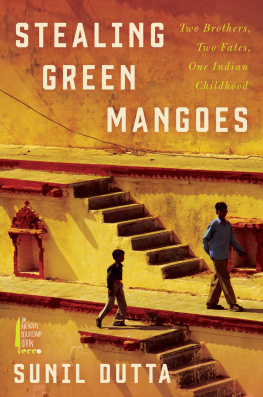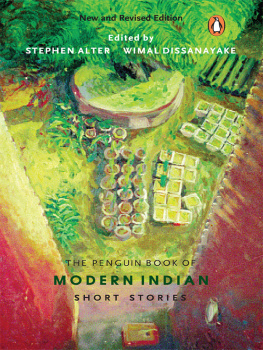Sunil Gangopadhyay - Stories
Here you can read online Sunil Gangopadhyay - Stories full text of the book (entire story) in english for free. Download pdf and epub, get meaning, cover and reviews about this ebook. year: 2002, publisher: Srishti Publ., genre: Detective and thriller. Description of the work, (preface) as well as reviews are available. Best literature library LitArk.com created for fans of good reading and offers a wide selection of genres:
Romance novel
Science fiction
Adventure
Detective
Science
History
Home and family
Prose
Art
Politics
Computer
Non-fiction
Religion
Business
Children
Humor
Choose a favorite category and find really read worthwhile books. Enjoy immersion in the world of imagination, feel the emotions of the characters or learn something new for yourself, make an fascinating discovery.
- Book:Stories
- Author:
- Publisher:Srishti Publ.
- Genre:
- Year:2002
- Rating:3 / 5
- Favourites:Add to favourites
- Your mark:
- 60
- 1
- 2
- 3
- 4
- 5
Stories: summary, description and annotation
We offer to read an annotation, description, summary or preface (depends on what the author of the book "Stories" wrote himself). If you haven't found the necessary information about the book — write in the comments, we will try to find it.
Sunil Gangopadhyay: author's other books
Who wrote Stories? Find out the surname, the name of the author of the book and a list of all author's works by series.
Stories — read online for free the complete book (whole text) full work
Below is the text of the book, divided by pages. System saving the place of the last page read, allows you to conveniently read the book "Stories" online for free, without having to search again every time where you left off. Put a bookmark, and you can go to the page where you finished reading at any time.
Font size:
Interval:
Bookmark:
Stories
Stories
Sunil Gangopadhyay
translated by
Sheila Sengupta

Srishti
Publishers & Distributors
Srishti Publishers & Distributors
64-A, Adhchini
Sri Aurobindo Marg
New Delhi 110 017
First English translation published by Srishti Publishers & Distributors
in 2006
Copyright original Bangla with Sunil Gangopadhyay
Copyright English translation with Sheila Sengupta
ISBN 81-88575-83-6
Typeset in AGaramond 11 pt. by Suresh Kumar Sharma at Srishti
Cover design: Sandip Sinha
Printed and bound in India
All rights reserved. No part of this publication may be reproduced, stored in a retrieval system, or transmitted, in any form or by any means, electronic, mechanical, photocopying, recording or otherwise, without the prior written permission of the Publishers.
Contents
Introduction | |
Translators note | |
A fugitive and a follower | |
Palatak O Anusarankari | |
Skyscraper | |
Akashchumbi | |
Riverside | |
Naditeere | |
The wooden bridge | |
Sanko | |
Virtue and sin | |
Dharmadhormo | |
Our Manorama | |
Amader Manorama | |
Shajehan and his own battalion | |
Shahjahan O tar Nijashwa Bahini | |
Damayantis face | |
Damayantir Mukh | |
A cup of tea at the Taj Mahal | |
Taj Mahale ek Cup Cha | |
Blood and tears | |
Rakta ebong Asru |
Introduction
Sunil Gangopadhyay (born 1934 in Faridpur, now in Bangladesh), the Bengali novelist, poet and short story writer, winner of, amongst others, the Sahitya Akademi Award in 1985, Indias most prestigious literary award, is one of Indias leading writers today, a voice that is noted for its fearless radicalism, wit, realism and humanism. This
collection of ten short stories, translated with sensitive proximity to the original by Sheila Sen Gupta, is an eclectic selection of his modern fiction. Set mostly in contemporary times, they could happen in any period anywhere in the world, such is the universality of the characters experiences and events. Yet they succeed in encapsulating Indias long history, conveying the contradictions that make up the vibrant fabric of India.
Every story comes as a surprise, each different from the others, the characters brought sharply alive as they unfold through the dialogues that are so much in character and fit the descriptions of them. The age-old dilemma of religious conflict, which can ignite into a conflagration in Indias volatile communal politics, is captured in the curious confrontation of police bureaucracy caught in the web of popular beliefs and concerns one rainy night in Virtue and Sin. The presiding Police Inspector Rahman suddenly sees the clouds on his consciousness lifting as the new moon appears and Fills him with the pride of Finding and guarding a valuable Hindu idol.
The communal dilemma acquires a complex twist in the long short story of the Dalit Bangshi, the village idiot who has the uncanny talent of appearing at the heart of chaos to become the target of inhuman beatings whenever the crowd needs a victim to chastise, reflecting the peculiar mentality of mob violence which targets the defenceless. Ironically, the story is entitled Blood and Tears and though Bangshi is beaten time and again till he bleeds, he is unable to shed tears to the consternation of his torturers. Bangshi is a sculptor in whose hands clay speaks eloquently, leaving his spectators jealously hostile. He has learnt the art from a Muslim mentor whose hands are cut off by his co-religionists for over-stepping, in their opinion, socio-religious boundaries. The conflicts of religious beliefs, superstitions and interests, threaten to paralyse Bangshi in a similar way, till, by a strange chain of events, he is sought out by the same judgemental society that once set out to nearly cripple him, to give shape to the deity he has emotionally and artistically striven towards all his artistic life.
There is a touch of mystery in many of Gangopadhyays stories, which makes them exciting reading, sometimes leaving the reader with innumerable questions, the ends untied, with many maybes ... adding to their charm. Manorama, the eponymous heroine of the story which bears her name, has all the unheroine-like qualities of being hefty, having a booming voice, ungainly hips and breasts, and is of a dark complexion, with a pock-marked face, yet she musters the joint devotion of four workers who consider themselves her self-appointed guardians and are her secret and jealous admirers. There is the undiluted pleasure of the Saturday dance and a platonic game of suggestive pleasure that this harmless quartet plays with Manorama, which is suddenly interrupted by the unprecedented. Gangopadhyays wry humour is evident in the metaphoric reading of the precarious existence of these men in their work as workers of a matchstick company, that brittle tool that has a short existence, its slender reality open to speculation about its continuity in the face of more stout competition in a fast changing economy. And the threat comes in the shape of a stranger, gentlemanly in appearance, who turns up one night and cannot be moved because of his burning fever. Who is this stranger? Where has he come from and why has he come here? How long will he stay? As Manorama feels she has to nurse him, her devoted troupe is harried with these unasked questions, just as the reader is, unravelling the skein of human longing for security, freedom or romance.
The stranger could be a political activist on the run, a Naxalite fleeing detection from the police or running away from his opponents as in The Fugitive and Follower. The unexpected gives a juicy twist to the tale as the fugitive is first pursued by the followers who chase their game, tenaciously following a list of possibilities. Once the fugitive is killed, his three followers then become the hounded as nine pursuers divide up in separate teams of three, the chase beginning again, with similar lists giving the cue for possible escape routes of the would-be victim. In another story of pursuit, The Bridge, we encounter the experience of a knife-edge situation as sadistic pursuers play a cat and mouse game with a prisoner who is made to walk a tight rope in a dance of the macabre. Just as he reaches the end, while the waters of the fierce Teesta gush below in the depths of the gorge on a dark moonless night, the fugitive starts walking back, leaving his captors breathless with amazement and uncertainty. The reader can hang narrowly on to hope in stories like this, visualising possibilities of tables turning here as in The Fugitive and the Follower.
The theme of escape finds fresh expression in the story of the reclusive life of Archishman waking up everyday to the stunning beauty of the Himalayas in Damayantis Face. The charisma of the simple, self-effacing Yogibaba seems to reflect the humbling, unspoilt wonder of the range that surrounds them. Layers of mountain mists lift as we realise that the hermit, in his wish to escape, has actually sought refuge from the agony of missing his chance of a romantic attachment to the girl he has always loved. But the mountains do not shut him in or the face of the woman he loved, out, and Archishman dies, watched over by the face of Damayanti, the woman he has tried to forget and remained faithful to in his hermits existence. This cinematic framing of the recluses past life etches him out as painfully human, having all the failings of selfish ownership that the best of people find themselves guilty of.
Next pageFont size:
Interval:
Bookmark:
Similar books «Stories»
Look at similar books to Stories. We have selected literature similar in name and meaning in the hope of providing readers with more options to find new, interesting, not yet read works.
Discussion, reviews of the book Stories and just readers' own opinions. Leave your comments, write what you think about the work, its meaning or the main characters. Specify what exactly you liked and what you didn't like, and why you think so.

